How Long Does It Take to Build A Gunite Pool?
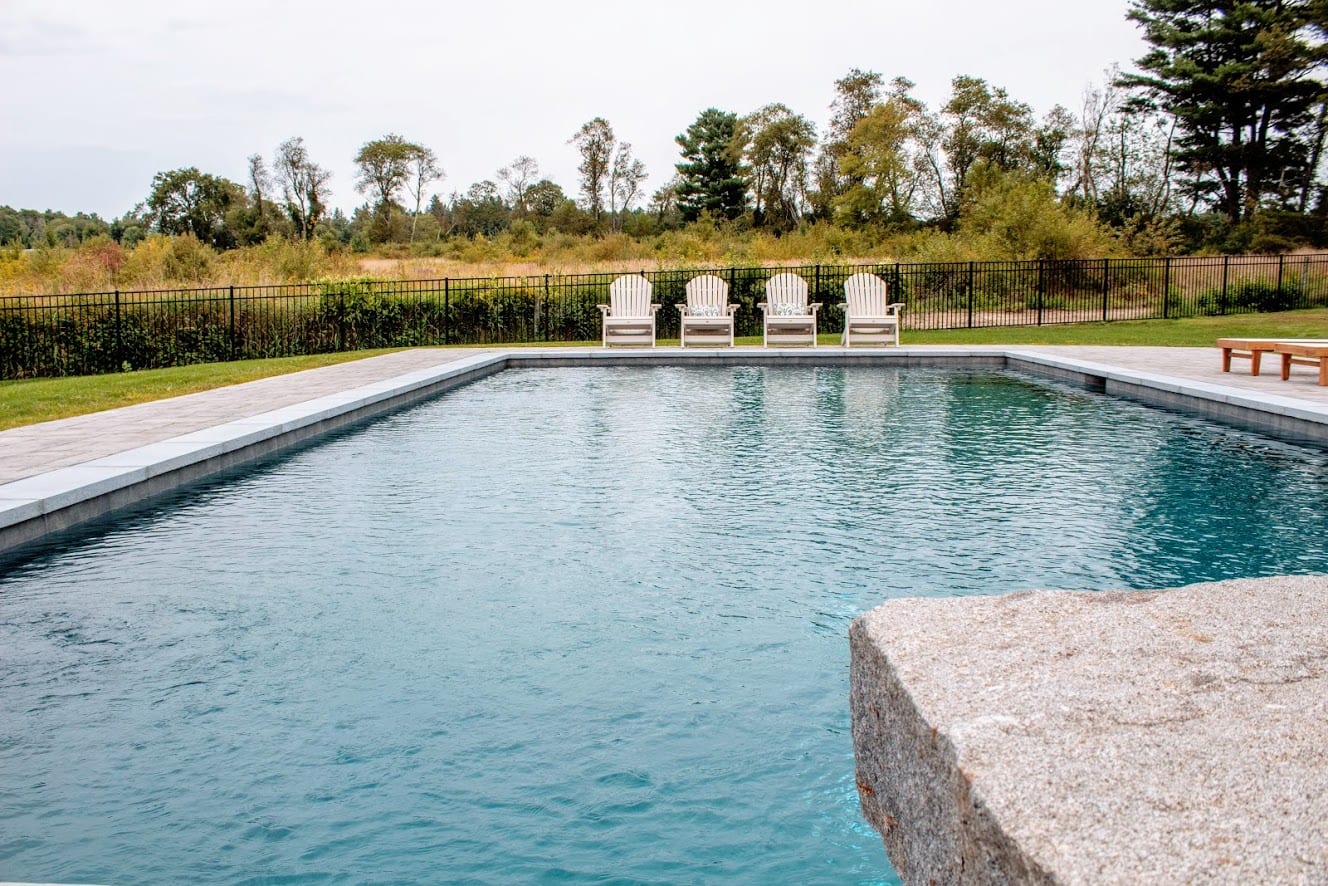
Quick Summary of Length to Build a Gunite Pool
One of the most common and difficult questions about gunite pools, how long does a pool take to build? The question is not hard to answer because a pool builder does not know. Instead, it is hard to answer because while a pool may be the focal point of a backyard project, it is not the only part.
Swimming pool construction takes the size of the pool and many feet beyond. Unless there are space constraints, this is commonly where the patio will be placed. Pools demand a big area that often conflict with the other backyard projects. These conflicts can affect the time frame of construction.
Our team has detailed some things that affect how long it takes to build a swimming pool. To help homeowners understand their role, we’ve broken things down into two main categories, items in your control and outside of your control. It should also be known that asking how long it takes to build a pool varies by region of the country. For this article, we focus on our region, New England.
At SSG, we find that analogies are helpful. How long your pool will take to build is like asking how long your work commute is in the morning. Most of the time, you’re pretty close with estimations, give or take 5-10 minutes. Occasionally, there’s a big accident that extends timelines. Building a pool involves many uncontrollable factors for the builder and the homeowner. By working together and having good communication, the factors that are controllable can be handled properly on both sides.
Items Within Your Control
Design Decisions
Finalizing decisions on colors, patio size and even pool size and shape after it has been excavated. Sometimes homeowners decide to change the shape of a pool after it has been excavated. Our team has even seen homeowners change their mind after the gunite (concrete) has been installed. SSG can handle design changes but they do add time to the project.
Additional Backyard Structures
Examples include backyard pool houses, sheds, or cabanas. Typically, backyard structures are very close to the pool. For a pool and pool patio to be completed, the structures foundation needs to be installed so that the pool plumbing and underneath the pool deck can be filled with dirt and compacted to build the pool deck on.
Your Electrician
It may be tempting to use a friend or relative who has electrical experience. It’s very common for this situation to add time to the project. Our team has seen these favors or side jobs go wrong countless times. Sometimes family friends cannot commit the necessary time to complete the project or they find themselves overwhelmed. Swimming pool electrical can be very complicated, some pools can require a significant amount of electrical work.
There are many moving parts when it comes to the electrical of a swimming pool. It’s not uncommon for there to be multiple motors, sensors, heating elements, disinfection items, lights, light systems, along with controllers and communication systems. All of which fall under the electrical code and are required by law to be installed by a licensed electrician. Even electricians that operate on pools regularly have to do research, check code books, and read instructions on how all of these components work together.
Complex Designs
Complex pool projects take longer than simple designs. Some pool projects require the pool to be built in specific phases, such as foundations to be installed before the pool can even be started. Some pools get large structures built on top of them or boulders installed within them and things like this need to wait until the concrete has gained its full strength.
Timing of Construction
The timing of construction plays a big role how long pools take to build. This is such a popular topic that we’ve published a blog specifically about when is the best time to build a pool in New England. Excavations typically cannot be performed in the winter. The fastest time to build a swimming pool is the middle of the summer. Swimming pool contractor’s schedules are lighter after July 4th.
Most homeowners don’t want their backyards under construction during the summer months. However, if you want to get a pool built as quickly as possible it is the time to do it. The planning process should start around May to capitalize on a summer construction time. Homeowners should even consider starting earlier if they anticipate permitting issues.
The next best time to start a pool for ease of construction is in September. The Fall season is a busier time and will not go as fast as summer but it will help ensure that the pool is ready for the following summer. All of the difficult parts of the construction process can be completed while the ground is typically more dry and the weather is more favorable. Even complicated projects starting in September can usually be completed for the following summer.
Spring is the busiest season for pool builders. Out of the available months, it is also the most difficult time of year to build a pool. Spring involves rain and therefore the ground is saturated with water. Rain and groundwater can create a wet yard which makes normal processes take more time. Given these factors, a little more patience is required to have springtime pool construction.
Final Fill of Water
The best way to fill a pool is by hiring a water company to deliver truckloads. Water companies pre-treat their water so that once it is in your pool, it only needs a small amount of chemicals and time to get it running properly. Backyard pools range from about 25,000 gallons to 35,000 gallons. A water truck holds 9000 gallons and pumps the water down a 4” hose into the pool. Most of the time a pool is filled by truck in 1 day or less.
If a homeowner chooses to use city water or well water, it can take much longer to fill a pool. An average well can only produce 8-10 gallons per minute. Therefore, a 30,000 gallon pool would require all of your well water for 2-3 days, providing the well has a good water supply. It is not uncommon for a well to run dry while trying to fill a pool. Once the pool is full of well water it can take a few more days to balance the well water. Well water can also have hard water or other minerals in it that can stain a pool adding time to clean the pool of the stains can mean no swimming because of the chemicals that are used to clean the pool. City water flows a little faster than well water and typically has less minerals that can damage a pool. Although, it can cause other issues if it has strange characteristics. For example, the water on Nantucket is overly soft and requires special chemicals to keep the water from sucking calcium out of the interior finish, therefore affecting the look and feel of your pool.
Items Out of Your Control
Backyard Surface Conditions
Pools can be built just about anywhere, even on steep slopes, hills, and even in the air. If the yard has a slope, a number of measures can be taken. The pool can be engineered to retain the uphill soil. Retaining walls can be added before or after pool structure construction. The location grade of the yard will usually dictate which actions needs to be installed first. Some pools are even built on deep foundations where piles or drilled piers are installed deep in the ground to hold the pool in place.
Backyard Subsurface Conditions
SSG has excavated over 10,000 pools in New England over the past 45 years. Our team is highly skilled at anticipating the level of difficulty with an excavation. However, sometimes surprises arise. We have found a lot of surprises during excavations, some add time to the project timeline and some do not.
Discovering ledge or very large boulders can add time to a pool project. Our equipment cannot move car-size boulders or bedrock. Soft soil conditions such as a layer of peat more commonly found near the coast, especially in maine, can also add to excavation time. Poor water conditions are also possible in these cases.
Stump dumps are especially common at the end of a dead-end development or cul-de-sac. Stump dumps are when someone (illegally) buries a large deposit of stumps from when they cleared the land for a new development. These can go down as far as 40’ sometimes and are a hassle to deal with but SSG can handle them.
Some of these inconvenient findings can add a day or two to a pool project. Other situations, warranting dynamite or a giant jackhammer can add weeks. If a pool turns out to have these conditions, it is important to remember that SSG can and will handle all of it.
Permitting and Town Approval
Most of the time the permitting process takes roughly 1 week. Some things can extend the process. If the desired pool location is within wetlands boundaries or property setbacks, there needs to be approval from the town to obtain a permit to build. Most of the time if the properties only option for a pool is within boundaries, but outside the buffer zones, the pool can still be built. Sometimes if the backyard is a wetland permission it cannot be obtained, but this is rare. Every town has a slightly different permitting process. To learn more about your town’s process, Google “[your town] pool permit”.
Summary
Now that we’ve reviewed some items that affect swimming pool construction duration, back to answering the basic question. If the location of the pool is relatively level, all decisions have been made up front, no other contractors will be involved with the project during pool construction, SSG manages the electrical, and no subsurface conditions are encountered a pool can be easily built from excavation to jumping in within 7-10 weeks. There may still be some final inspections and small items to settle, but after that 7-10 week period, people can jump in the pool as it’s being filled up with water.
It’s important to have a full plan before construction. That way, you can ask the pool builder’s supervisor or other contractors how decisions affect each other. A plan helps ensure that everything is lined up to happen at the right time so nothing holds anything else up.
In most residential pool projects, the homeowner is required to act as a general contractor. The homeowner taking on this role will typically be save 15-25% of the total project instead of hiring a general contractor to manage everything. Even with a general contractor involved, the homeowner is still required to make a lot of decisions, but the GC will let the homeowner know when to make them. If the homeowner acts as the GC, they will need to be prepared to ask lots of questions. We’ve seen plenty of pools built using both models, it’s entirely the homeowner’s preference.
Preparing For Your Pool? These Blogs May Help.
Red Flags When Buying a Gunite Pool
How Much Does a Gunite Pool Cost?
The Best Time to Build a Gunite Pool in New England
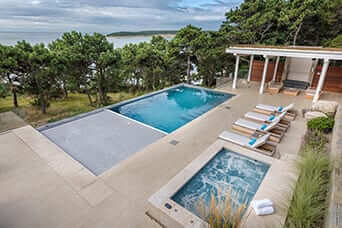
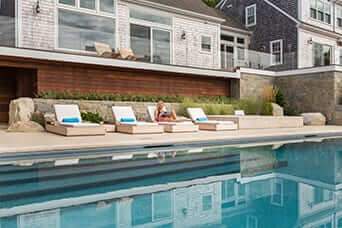
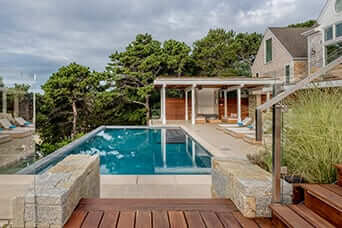
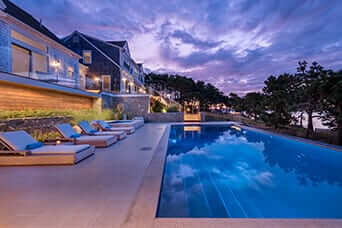
WHAT PEOPLE ARE SAYING ABOUT US
Our Work Brings Great Reviews
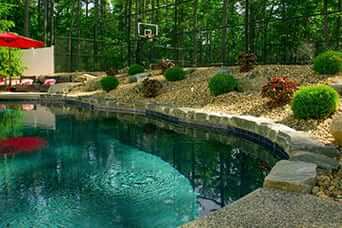
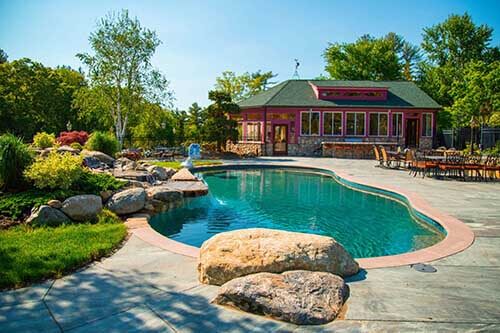
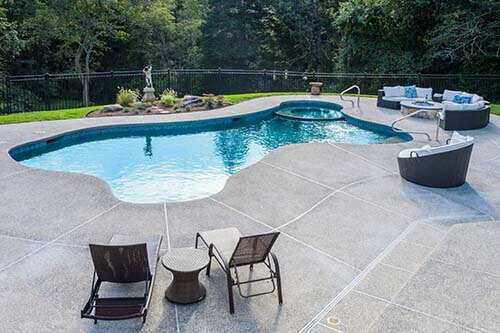
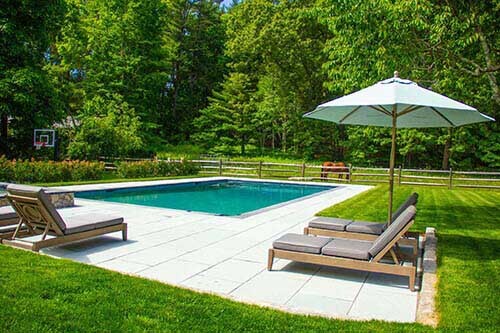





10,000+
Pools Completed
45+
Years In Business

6
States Serviced
SERVING Massachusetts, New Hampshire, Rhode Island, maine and Vermont
Contact SSG Pools - New England's #1 Swimming Pool Builder
If you're in search of pool deck installers to complement your new pool construction, renovation, or outdoor living space, South Shore Gunite is your premier choice. If you would like to schedule a consultation with our pool design team or you would like more information regarding new pool construction, pool renovation, pool service, water features, or outdoor living spaces from South Shore Gunite, please feel free to contact us directly by calling 800-649-8080 or complete the form below. Please review our privacy policy for details on how we handle your personal information.
